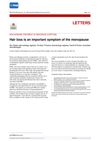Psychosocial Aspects of Androgenetic Alopecia
November 1992

TLDR Hair loss can cause significant social and emotional issues, especially for women and young men.
The document from 1992 explores the psychosocial impact of androgenetic alopecia on individuals, particularly focusing on the psychological and social difficulties experienced by those with hair loss. It highlights historical and symbolic aspects of hair, the negative perceptions of baldness, and the psychological importance of hair in terms of attractiveness and self-esteem. The studies mentioned in the document reveal that men with androgenetic alopecia from the general population do not show abnormal psychological characteristics but are less satisfied with their hair compared to men without alopecia. Women with androgenetic alopecia, on the other hand, experience lower self-esteem and more psychological problems than men with the condition. The research included a study of 59 men with androgenetic alopecia compared to 161 without, and another study involving 168 men in a clinical trial for minoxidil, which found that while most did not exhibit psychological malfunctioning, a substantial number reported specific problems associated with hair loss. Another study compared 58 women with androgenetic alopecia to a control group and found that these women had significantly more psychosocial problems. The document concludes that androgenetic alopecia can lead to significant psychosocial issues, and there is a need for more research, particularly concerning the impact on women and younger men, as well as the cognitive processes involved in the perception of hair loss.








